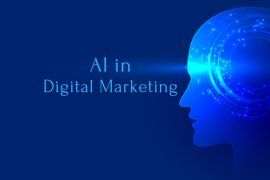The last few years have been challenging for the majority of industries around the globe. The impact of the pandemic has led to fundamental shifts in how consumers behave and brand strategy, as well as their decision-making process and mentality.
Companies across all sectors and sizes to adjust or even pivot to survive the changing market conditions and cyber-security challenges brought by the pandemic. However, Google reported a 30 percent YoY increase in eCommerce sales in 2021.
Table of Contents
What is Marketing Technology (MarTech)?

Marketing helps companies to grow. Alongside traditional marketing, businesses have begun to incorporate new marketing techniques into the mix. According to one study that marketing technology accounts for 26% of the marketing budget. But, despite this, brands only use 58 percent of the capabilities available in the marketing tech stacks they have.
Here’s where trends in marketing technology are helpful. 60% of companies plan to raise their MarTech spending over the next twelve months, aiming to increase revenue by a factor of two. Existing companies are tapping into marketing technology, while many new companies are developing software that can assist marketers in growing.
What is Considered MarTech?
With the myriad software options available to firms, it could be challenging to determine which solutions fall under the broad definition of MarTech. In essence, it’s about the MarTech stack, which assists marketers in establishing marketing strategies and putting them into action through marketing strategies and campaigns. These tools provide consolidated information that better describes the marketplace and consumer behavior. They also provide tools to connect with consumers and respond to their desires, preferences, and needs. It’s about data-driven advertising.
With the aid of MarTech tools, information from customers regarding their experience using different products can be gathered from various sources like social media, online shopping platforms, or search engines.
MarTech solutions can be utilized to:
- Gather and analyze customer information,
- Reach target audiences
- Automate repetitive tasks.
MarTech solutions can be incorporated into the software to help control marketing attribution, such as email marketing software, Customer Experience Software, Content Management, or CRMs.
Top 5 Marketing Technology (MarTech) Stats & Trends in 2022
1. More Tools by More Spending.
According to Gartner, the marketing technology market is already a significant line item for most marketing teams, accounting for 26.2 percent of an overall marketing budget. Yet, despite spending most of the overall budget, executives are insistent on expanding their MarTech infrastructure. Gartner discovered that the CMOs of 68 percent intend to boost their technology spending through 2021. The market for MarTech is expected to expand, not just because of new and innovative products but also due to disruptions caused by the COVID-19 pandemic.
Marketers have to become more deliberate about their spending on digital marketing, and purchasing specific tools for marketing is essential for attributing the right amount of analysis and taking action in the new market environment. The majority of marketers believed that investing in MarTech was expected.
2. Information Access as well as Personalization of the Cookie-Less Future
As you read this, there’s plenty of information floating around on the internet, and it’s ready for picking. The trend for big data has become the standard, and there are many opportunities to gather or buy data from anywhere you go. But some business leaders believe that the changes are on their way, and it’s not only about GDPR and CCPA.
Today, leaders are concerned about the potential consequences of a cookie-free future. Cookies have been among the most popular ways marketers get insights into marketing-related interactions from the start of web-based technology.
However, that time is about to come to the end of the road. Browsers such as Safari and Firefox have already eliminated third-party cookies, and Google Chrome has committed to removing third-party cookies by 2022. This means that marketers have under a year to change their data collection strategy and find the right tools to implement that new approach. Look for a tool MarTech can use to gather and assign information about consumers that is not based on cookies. The use of a system that can analyze aggregate data and individual-level data during this transitional period will enable you to make clear and timely choices using smaller amounts of cookies.
3. Accounting for Events that aren’t Normal
Everyone will never forget how COVID-19 changed the world throughout 2020, and marketers felt the effects of the disruption caused by COVID-19. When people changed their buying habits and lifestyles fast, the majority of companies weren’t sure of their next move should be. At the moment, it appears that the COVID-19 controversy is beginning to settle down. It’s just an issue of time before another argument is uncovered. If your team isn’t looking for tools within the Martech world to assist them in preparing for unanticipated circumstances, your team could be caught off guard.
Of course, there isn’t a working crystal ball available to examine; however, a platform for marketing analytics that makes use of Bayesian learning and forgetting will bring it close enough. If there’s a disturbance within your customers If there is a disruption among your customers, there will be a disruption in your customer base. The bayesian algorithm will detect and “forget” irrelevant data, reinforce the relevant data, and continue collecting information that reveals new patterns and trends. This gives you an advantage over your rivals in the event a scandal or extraordinary event occurs. As mentioned before, COVID-19 changed how Martech technology operated from 2020 to 2021. Martech Expert Scott Brinker says about 20 percent of the MarTech solutions this year weren’t available last year.
4. Full-Cycle Reporting is Focused on the Measurement of ROI
Alongside the integrations with MarTech and the rise of fully-cycle data, reporting has also been rising. Every marketer today recognizes that there’s nearly everything that can be measured online. For any marketer, a vast information pool is at their disposal. Therefore, by integrating systems, marketers’ lives will be much more accessible by analyzing the ROI of marketing.
Furthermore, issues like funnel reporting, revenue attribution, and revenue reporting will be feasible by integrating these systems.
Additionally, real-time dashboards could be helpful in this regard. But, specific solutions provide integrated reporting too.
5. The Adoption of Virtual Reality in Marketing Strategy
Marketers constantly race to draw more attention and keep growing customers. Using Virtual Reality will give brands the edge over competitors. Already, a lot of companies are experimenting with VR. Some apps let customers look at how the item will appear in their home before making a purchase. Provide a great example of using this technology to improve the user experience.
Because VR gives you a full 360-degree view, a virtual model of products is easily an attractive option for buyers who are looking for an interactive experience, thereby easing the purchasing process.
Conclusion
Marketers must keep these developments in mind when they evaluate the MarTech landscape and their current MarTech platform for any gaps. It is always best to adopt an approach that is proactive to the latest developments in the field of marketing instead of reacting to changes when they have a tangible impact on your company.
A little preparation is a great way to choose the right vendor to meet your requirements, create stores with quality data, and ensure that your platform will be correctly integrated.






